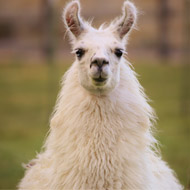
Researchers derive synthetic antibody from llama blood
Researchers in California have developed a new influenza treatment that can work across an array of different virus strains.
BBC News reports that the treatment was derived from llama blood and was successful in neutralising 59 out of 60 different viruses used in the study.
Researchers hope the discovery will lead to a treatment that can be used from season to season, and also protect people against emerging pandemics.
Llamas produce tiny antibodies that are much smaller than our own. Human antibodies are prone to attacking the tips of the proteins that protrude out from a virus, but llama antibodies can bury deeper, attacking the parts that influenza cannot change.
In the study, scientists at Scripps Institute in California infected llamas with multiple types of influenza to provoke an immune response. The researchers then searched the llamas’ blood to find the most potent antibodies that could attack a wide array of influenza strains.
Using four of these antibodies, the team then set about building a synthetic antibody that utilised elements from each. The antibody was then tested on mice that were given deadly doses of influenza.
Professor Ian Wilson told the BBC that of the 60 different viruses used in the challenge, only one wasn’t neutralised - a virus that doesn’t infect humans.
Two approaches to administering the antibody were used in the study - injection and gene therapy.
Genetic instructions for producing the antibody were placed inside a harmless virus and used to infect the noses of mice. The cells in the nose lining then started making the antibody the kills influenza.
Researchers say that an additional benefit of this approach is that it could work in the elderly. This is because as we age, the weaker own immune system gets and the less effective the seasonal influenza vaccine becomes.
University of Nottingham Professor Jonathan Ball told the BBC: "Having a treatment that can work across a range of different strains of virus is highly sought after. It's the Holy Grail of influenza.
"There will be an appetite, but it depends how well these things work, how easy it is to produce and also how costly it will be.”
The study, Univeral Protection against influenza infection by a multidomain antibody to influenza hemagglutinin, is published in Science.



 The Animal and Plant Health Agency (APHA) has updated its online reporting service for dead wild birds.
The Animal and Plant Health Agency (APHA) has updated its online reporting service for dead wild birds.